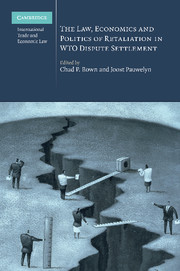Book contents
- Frontmatter
- Contents
- List of tables and figures
- Contributors
- Introduction: trade retaliation in WTO dispute settlement: a multi-disciplinary analysis
- PART I Background and goal(s) of WTO retaliation
- PART II A legal assessment after ten arbitration disputes
- PART III An economic assessment after ten arbitration disputes
- PART IV The domestic politics and procedures for implementing trade retaliation
- 8 The United States' experience and practice in suspending WTO obligations
- 9 The European Community's experience and practice in suspending WTO obligations
- 10 The politics of selecting trade retaliation in the European Community: a view from the floor
- 11 Canada's experience and practice in suspending WTO obligations
- 12 Is retaliation useful? Observations and analysis of Mexico's experience
- 13 Procedures for the design and implementation of trade retaliation in Brazil
- 14 Retaliation in the WTO: the experience of Antigua and Barbuda in US–Gambling
- PART V Problems and options for reform
- PART VI New frontiers and lessons from other fields
- Index
13 - Procedures for the design and implementation of trade retaliation in Brazil
Published online by Cambridge University Press: 26 February 2010
- Frontmatter
- Contents
- List of tables and figures
- Contributors
- Introduction: trade retaliation in WTO dispute settlement: a multi-disciplinary analysis
- PART I Background and goal(s) of WTO retaliation
- PART II A legal assessment after ten arbitration disputes
- PART III An economic assessment after ten arbitration disputes
- PART IV The domestic politics and procedures for implementing trade retaliation
- 8 The United States' experience and practice in suspending WTO obligations
- 9 The European Community's experience and practice in suspending WTO obligations
- 10 The politics of selecting trade retaliation in the European Community: a view from the floor
- 11 Canada's experience and practice in suspending WTO obligations
- 12 Is retaliation useful? Observations and analysis of Mexico's experience
- 13 Procedures for the design and implementation of trade retaliation in Brazil
- 14 Retaliation in the WTO: the experience of Antigua and Barbuda in US–Gambling
- PART V Problems and options for reform
- PART VI New frontiers and lessons from other fields
- Index
Summary
Introduction
Brazil is one of the most active participants in WTO dispute settlement proceedings and one of the few to ever have been granted authorization to suspend obligations under Article 22 of the DSU. However, it is also just one among the many WTO members that have never actually resorted to suspension of WTO obligations. Given this lack of experience, one might ask why it is important to expend ink to introduce Brazil's domestic procedures to that effect. Abstract intellectual curiosity aside, the justification for this exercise is twofold. First, although optimistic, Brazil's lack of experience in suspending WTO obligations will certainly not last forever: the ongoing arbitration in the Cotton dispute immediately comes to mind, for example. Indeed, the looming retaliation against the United States in the Cotton case has triggered a quest within Brazil for domestic instruments that would facilitate a response to non-compliance. In particular, legislators have been pushing forward a bill regulating retaliation under the TRIPS agreement which, to my knowledge, is unparalleled among WTO members. Hence, Brazil's endeavour provides an interesting test case on the creation of instruments to suspend intellectual property rights in domestic legal systems based on WTO rules. It also illustrates the strong connection between domestic law instruments and the ability to implement trade retaliation, a link all the more interesting when it comes to the uncharted waters of ‘cross-retaliation’.
- Type
- Chapter
- Information
- Publisher: Cambridge University PressPrint publication year: 2010

